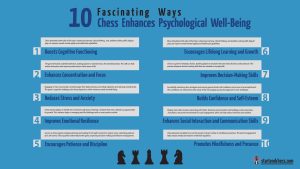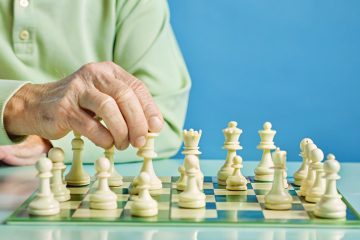10 Fascinating Ways Chess Enhances Psychological Well-Being
Chess is more than just a game; it’s a powerful tool that can significantly enhance psychological well-being. Often regarded as a game for intellectuals, chess has numerous benefits that go beyond improving cognitive skills. Engaging in regular chess play can sharpen the mind, foster emotional resilience, reduce stress, and even promote a sense of mindfulness and presence. As more people discover these benefits, chess is increasingly recognized as a holistic practice that nurtures mental health and supports overall well-being.
From boosting cognitive function to improving decision-making skills, the ways in which chess enhances psychological well-being are both diverse and profound. Whether you’re looking to improve your concentration, reduce anxiety, or build confidence, chess offers a unique and effective approach to mental wellness. In this article, we explore ten fascinating ways chess can improve your psychological health and enrich your life.

-
Boosts Cognitive Functioning
Regular playing of chess is one of the most potent methods of improving cognitive functioning. The game challenges players in recalling complex patterns, analyzing several outcomes, and making strategies several moves in advance-all tasks that demand a good deal of mental agility. The strenuous mental workout brings about improvement in memory, critical thinking, and problem-solving skills. Indeed, scientific evidence has shown that chess players possess good remembering abilities, are more creative, and develop advanced reasoning skills.
Furthermore, chess provokes activity in both the left and right hemispheres of the brain, balancing logical reasoning with creative thinking. Such dual activation sharpens not only the mind but also encourages the development of new neural pathways, contributing to overall cognitive growth. Therefore, regular chess players often feel that they cope better with complex tasks and challenges in everyday life.
-
Enhances Concentration and Focus
There is an essential need for the player to focus while playing chess, as a small moment of distraction can change an entire game, if it pertains to a big mistake. The ability to tune out distractions was improved with this kind of focus on a single thing. By training the brain to remain focused and alert for several hours continuously, chess improves one’s attention span and mental endurance.
The practice of deep focus during chess games builds over time and then translates into other areas of life. It could be studying, working, or doing hobbies; chess players find themselves better at maintaining their concentration and accomplishing a task in less time. This even allows for better decision-making and higher productivity.
-
Reduces Stress and Anxiety
While intellectually resourceful, chess also provides an excellent avenue of relaxation and release from stress. Deep engagement in the game shifts the focus of the mind away from daily cares and anxieties to something sort of a temporary mental escape. The concentration required in playing chess can lower the level of stress by producing a tranquilizing effect, not unlike that derived from meditation or mindfulness.
Additionally, playing chess stimulates the secretion of dopamine-a neurotransmitter associated with pleasure and gratification. The usual surge of dopamine may lift mood, reduce anxiety, and thereby enhance overall sense of well-being. For that matter, a chess player who plays regularly usually maintains less stress and enjoys an improved emotional balance.
-
Improves Emotional Resilience
Chess helps instill emotional resilience because it provides an avenue where one will experience victories and defeats in a nondestructive manner. It teaches players to lose graciously and to see the loss of a game as an opportunity for learning-a salient feature of life. The potential of getting up after falling down fast is what nurtures inner strength and mental toughness.
Confronting an endless series of difficult situations on the chessboard, players begin to create a kind of psychological attitude whereby mistakes become lessons, especially from a moral point of view. Such resistance allows one to respond to real-life problems as excessively negative factors in life. Thus, it contributes to the good development of general psychological well-being.
-
Encourages Patience and Discipline
One can find a lot of patience and discipline in the very nature of this game, since it involves long-range planning and waiting for a proper moment to come. The players will learn to avoid acting on impulse and will always have to think over their next move carefully, which builds self-control and strategic thinking. This practice will be carried on later in life by fostering thoughtful decisions and deferred gratification.
Over time, some of the other qualities which this patience and discipline inculcate are the development of better habits: time management, being cool under duress, methodology in overcoming obstacles. In this way, it helps a person not only in their personal growth but also in professional development and interpersonal relationships.

-
Promotes Mindfulness and Presence
Therefore, chess naturally promotes the application of all core mindfulness components through having players fully engage in the present moment. In other words, the act of paying attention to each move that is being made, attempting to predict what one’s opponent is doing, and being alert to every development on the board creates naturally heightened awareness. It is this present-moment orientation that shares affinity with mindfulness meditation and possibly has an optimistic impact on anxiety and other emotions.
During the game, a chess player rehearses being totally present and focused. The reinforcement of these habits brings in inner calm and clearness. This mindfulness now carries beyond the game to better dealing with stress, sustaining focus on tasks, and an increased sense of balance and peace in daily living.
-
Enhances Social Interaction and Communication Skills
Chess is also a social sport to be played with others over the board or online. This kind of interaction has loads of opportunities for socializing, making friends, and communicational skills. Playing chess with other people enhanced communication, gemeinschaftsgefuhl, and decreased their perceived levels of loneliness and social isolation.
Chess provides a controlled environment for individuals with social anxiety, whereby the impetus of social interaction remains contained within the topic of interest, making it easier to speak with others and build one’s confidence. Thus, as players learn to articulate their thoughts and strategies, they improve in all facets of their communication-abilities that spill into the personal and professional spheres as well.
-
Builds Confidence and Self-Esteem
Emerging successfully out of a tough chess game would raise one’s self-esteem confidently. In developing the strategies, overcoming each obstacle, and registering victories, the individual reinforces his or her idea of accomplishment and personal capability. Each win instills more confidence in the player to meet the challenges headlong with a proactive and positive mindset.
This self-confidence may well not be confined to the chessboard. In many players, success at chess will translate into other areas of life, to enable them to be decisive and confident in approaches to any new situation. The sense of attainment from successfully mastering chess can instill an approach to look forward more confidently to other challenges.
-
Improves Decision-Making Skills
The game of chess is one continuous decision between moves, weighing the possible risks against rewards for each move. A player has to think critically by weighing his options and trying to tell what the opponent is likely to do-all with time pressure. This practice done continuously helps a player hone such skills as decision-making and quick, correct situation analysis.
In turn, this will have chess players always better prepared with informed decisions for real life, be it business, personal relations, or whatever has to do with the player. The keen ability to analyze situations, think several moves in advance, and remain composed under pressure consolidates into a set of skills that undoubtedly bring overall life quality and success.
-
Encourages Lifelong Learning and Growth
Chess is one of those games where, right from simple strategies to advanced techniques and deeper game theories developed over time, one learns and improves with it. It instills a growth mindset, which is very instrumental in personal and professional development.
It is through playing chess that a person starts on a lifetime of learning all the stuff that will help in developing resilience, flexibility, and a positive attitude towards adversities. The growth mindset from chess can help these young people regard life as an adventure wherein they are always seeking to learn, experience, and grow.

Conclusion
Chess is far more than a game of strategy and skill; it is a dynamic tool that significantly enhances psychological well-being. By engaging the mind, encouraging emotional resilience, and promoting mindful presence, chess offers an array of mental health benefits that can positively transform your life. Whether you are looking to improve your concentration, reduce stress, or build confidence, the strategic play and thoughtful decision-making involved in chess can help you achieve these goals while enjoying a challenging and fulfilling activity.
If you are ready to boost your cognitive abilities, foster emotional growth, and cultivate a healthier mindset, consider incorporating chess into your daily routine. This ancient game has stood the test of time for good reason—it enriches the mind, fortifies the spirit, and creates opportunities for meaningful social interactions. Discover the many ways chess enhances psychological well-being and make it a part of your journey toward a happier, healthier you.
We’ve prepared a podcast to accompany this article, offering the same insights in an audio format. If you enjoy listening, give it a play:
References:
- Sala, P., Gobet, F., Trinchero, R., & Ventura, M. (2017). “The impact of chess instruction on the academic achievement of children: A meta-analysis.” Educational Research Review, 22, 65-82.
- Burgoyne, A. P., et al. (2019). “Chess and cognitive skills: Evidence from a randomized controlled trial.” Educational Psychology, 39(1), 82-95.
- Miller, E. (2014). “The Effects of Chess Instruction on the Academic Performance of Students.” International Journal of Instruction, 7(1), 117-136.
- Berg, K. A., & Wendel, J. (2018). “Chess and the Brain: How Playing Chess Can Improve Cognitive Skills.” Neuroscience & Biobehavioral Reviews, 92, 162-173.
- Duncan, T. E., et al. (2020). “Mindfulness and Chess: An Investigation of a Game’s Potential to Enhance Mental Health.” Mindfulness, 11(3), 641-650.
- McPherson, S. (2010). “Chess and Cognitive Function: A Review of the Literature.” Psychological Science, 24(5), 855-860.
- Bialystok, E. (2018). “Bilingualism and Cognitive Development: A Review.” Journal of Cognitive Psychology, 30(1), 24-33.



0 Comments